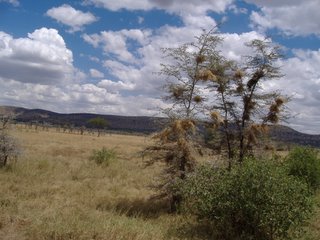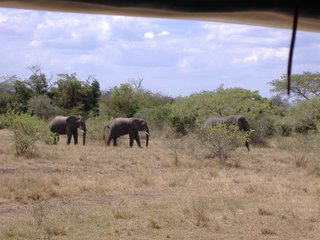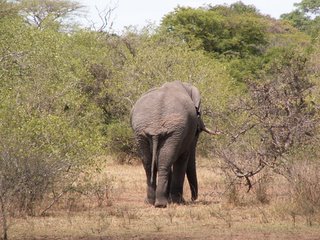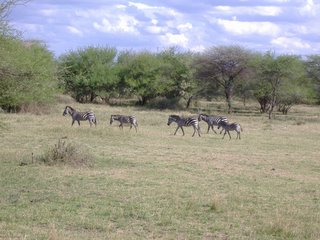On the Serengeti

Thursday, September 1, 2005
The Serengeti was huge under a vast open sky. I folded my arms on the window-ledge of the truck and rested my chin on them, dreamily watching as the truck rolled quietly through the yellow savannah.

Acacia trees grew here and there, landmarks in the waving grasslands. We are here in Africa's winter, the dry season, and sometimes we saw areas of scorched earth, evidence of grass-fires. Here on the edges of the Serengeti, we did not expect game to move in big herds, especially as it is not the annual migration season.

But there was still lots to see--zebras, kicking up their heels in a cloud of dust as we passed; ungainly wildebeest and graceful impala; a lone hyena loping along.

There were twittering trees with colonies of birds' nests, and tall trees filled with hunched and grotesque marabou storks. There were the rust-red pointy hills of termite mounds, stately ostriches, and families of roving baboons.
And when we turned off the main track to take a detour down to the forested banks of the Grumeti River, we let out gasps of excitement as we sighted our first African elephants.
There were three of them, moving slowly through the shrubby woodland. At first, it was hard to see them, camoflauged behind the trees. Although they are massive animals they move extraordinarily quietly and their dusty grey hides blend surprisingly well with the subdued colours of the landscape.

Then they moved into the open and came quite close to us, swaying gently as they walked,
 before turning and retreating back into the acacia woodland. Jen was so thrilled! Out of all the animals she'd wanted to see on this trip, it was elephants that were special to her.
before turning and retreating back into the acacia woodland. Jen was so thrilled! Out of all the animals she'd wanted to see on this trip, it was elephants that were special to her. 
As we travelled across the Serengeti, we would often see evidence of tree damage caused by elephants. They consume a massive amount of vegetation daily, and often simply break a tree by pushing it to get to the tastiest parts.

We moved further along the dirt track, down towards the Grumeti.
As we rounded a corner the water came into sight and we were rewarded by the sight of an enormous pod of hippos soaking in the river. There was probably as many as thirty of them, maybe more! It was hard to tell because some animals were almost completely submerged, showing only eyes, tender pink ears, and massive flared nostrils. It was a lumbering river of grey and pink bodies, grunting and sighing and jostling.

There was even two amorous hippo friends, an educational sight to be sure!
We followed the river around a bend, and shallow river-pools revealed more hippos wallowing in the murky water. It was amazing to see so many of them together.

We also spotted a crocodile, our first and unfortunately the last in the wild on this trip. (Although we did meet our share of crocodiles, as I will tell you later). The Grumeti River is famous for particularly large crocodiles, but they were shy and retiring today. Our lone crocodile floated very quietly, regretfully hard to see, like a bumpy brown log with unblinking eyes.
Apparently, during the rainy migration season from May-July, the banks of the Grumeti are often the scene of dramatic struggles between the gigantic crocodiles who lie in wait and the hapless zebras and wildebeest who try to cross the swollen river.

I suppose a bloodthirsty part of me would be thrilled to see that hunt take place, but I am just as happy today to be amused by the grunting hippos and not see any poor ungulate become a reptile's lunch.



1 Comments:
"grotesque marabou"
yes.
yes indeed!
Post a Comment
<< Home